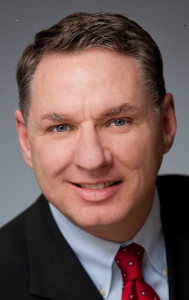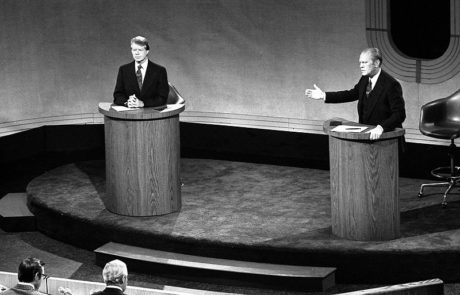 |
ROBERT HARRIS Oregon Outpost |
Almost a hundred people attended The Equal Vote Conference held at the University of Oregon Law School Saturday October 4th
Former Attorney General Dave Frohnmayer greeted the attendees/ The conference focused on election reforms and featured a debate between proponents and opponents of Measure 90 (top two primary).
The conference opened with explanations of two main voting reforms. Rob Richie Executive Director of FairVote.org presented the case for preferential voting with instant runoff elections (IRV), while Aaron Hamlin from the Center For Election Science, argued the benefits of Approval Voting as a superior voting system.
That session was followed by Jackie Salit, a national figure promoting the rights of independent voters and President of IndependentVoting.org. Salit humorously recounted listening to OPB’s “Think Out Loud” while in her rental car driving to Eugene from Roseberg, where she had met with an organization of independent voters the day before. The OPB analysts had seemed confused how the pro top two primary coalition could include both major candidates for Governor, the Working Families Party, wealthy philanthropists, independent voters and businesses, while opponents included the leaders of both the Democratic and Republican Parties. She was not shocked about the inability of the political establishment to understand the independent voter movement. However she noted the movement’s positive influence on politics already. “We’ve brought the Democratic and Republican Parties together and reduced partisanship” Salit joked.
A panel discussion followed Salit’s presentation. Salit Joined minor party leaders Barbara Hughes of the Working Families Party, Blair Bobier of the Pacific Green Party, Dan Meek of the Independent Party of Oregon. Hughes said the Working Families Party was in favor of M-90. Bobier explained that the Pacific Green Party was in favor of election reform, but not M-90. Bobier beleived it would lead to the elimination of smaller minor parties and business interests would dominate the general election.
Dan Meek said the Independent Party platform focused on anti corruption and that election reform was a major part of the anti corruption efforts. Meek said that the inability of non affiliated voters to participate in the May primary would be addressed by 2016. By that date, according to Meek, the IPO would have reached major party status and participate in the May primary along with the Democratic and Republican parties. The IPO intended to allow non affiliated voters to participate in IPO primary elections. Given the growth of the IPO and non affiliated voters, and the decrease in GOP membership, it’s likely an open IPO primary would have more eligible voters than the GOP primary. (NOTE: Shortly after the conference the IPO formally endorsed M-90)
The next main session was a debate on Measure 90 between proponents Chief Petitioner Jim Kelly, and co draftsperson Mark Frohnmayer and opponents Rep. Phil Barnhart and Lane County Democratic Chair Julie Fahey. There were two memorable things from the debate. First, Barnharts continued refusal to answer questions he finds difficult. He simply labels them red herrings. And Second, Barnhart revealed that Democrat Rep. Val Hoyle was drafting a Democratic Party election change that would allow non affiliated voters to participate in the May primary election. They would simply have to request a Democratic of Republican ballot and wouldn’t be required to change party affiliation. This is actually a more restrictive type of semi open primary.
While the Hoyle proposal is a concession to voters unhappiness with Oregon’s closed primary, it’s worth noting that in New Hampshire, the only legally recognized political parties are the Democratic and Republican. How any election changes based on a State where the election laws have resulted in only two legally recognized political parties can fairly be characterized as “reform” I’d like explained to me. (1)
Some observations/comments:
Election reformers need to quit arguing about the “best” way to count votes. Whether it’s approval voting or preferential voting is not worth arguing about. Pick one. Then get together and work for legislation. Lack of agreement is being used by opponents of reform.
Anti Corruption reforms requires both election reform and campaign finance reform (CFR). Election reform by itself is subject to attack as both insufficient reform and subject to manipulation by powerful interests. Coupling CFR with election reform would innoculate the argument that large businesses are behind the anti corruption efforts.
I listened to discussions and debates about election reform between attendees during breaks. Non affiliated voters are naive to believe they can make any substantive improvements in our Democracy without a political organization that uses Oregon laws to their fullest effect. Forming the IPO and using the power of laws that were supposed to be intended to benefit solely the Democratic and Republican Parties is the most effective way to bring change. What the Democratic and Republican leaders most fear (not the average D or R member) is that non affiliated voters actually organize into a political force using the laws as they exist now. They are more than happy to debate all the laws you think should be implemented because they will talk them to death and propose a “non reform” reform.
Lastly, another conference should be held shortly after the November election. Whether it’s a discussion of how to implement M-90 – should it pass – or a discussion of other ways to reform our Democracy – should M 90 fail.
See you there.
1. I’ve read the New Hampshire “open primary” laws and believe the Oregon Democratic proposal – if based on these laws- is intended to give the illusion of choice, but designed to force minor party voters to choose between participating in primary elections or being minor party members. (More on that analysis as soon as the Democratic Party releases it’s primary election changes)
Share on Facebook


